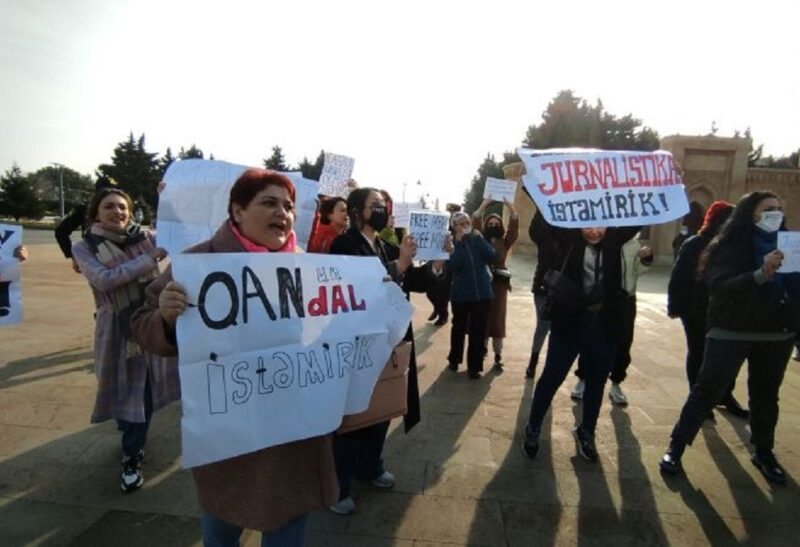Once, in the heat of an argument with his opponents, one of the greatest philosophers and thinkers of the 18th century, the great Frenchman Voltaire uttered a phrase which was destined to become a catch: “I do not agree with what you have to say, but I’ll defend to the death your right to say it.” The whole life of this extraordinary man was marked by the struggle with not only the existing power, but also his tireless and relentless fight against the dominance of the church which he pursued with strong arguments and powerful arrows of logic and sarcasm.
My recall of the quote by the great philosopher in the beginning of the article was not accidental. Although more than 200 years passed since, nowadays there are still many countries in the world where people have to pay the highest price for the right to freely express their thoughts. As an example of such a country, unfortunately, one can name the modern Azerbaijan where for the right to speak people are killed, imprisoned, forced to emigrate, and the rest are forced to work under the pressure of self-censorship.
The theme of self-censorship in the modern Azerbaijani society remarkably resembles the unforgettable Soviet times when there was a taboo on criticizing Soviet ideology in all print media. The execution of this self-censorship was closely monitored by the security services in the form of KGB – the punishing body of the existing system. The only difference is that if during the Soviet Union times an official body Glavlit (General Administration of Literature and Publishing) functioned to monitor censorship over all print media, today in Azerbaijan a structure like this does not nominally exist. However, in spite of this control has been going on under a different foreshortening to combat the dissent. If the role of the secret services to find opponents of authoritarian Aliyev regime can still be somehow explained, it is still hard to understand the behavior of many members of the media that position themselves as independent.
Today in Azerbaijan you will not encounter any printed edition that hasn’t applied self-censorship, however, the most unfortunate point is that it is carried out not only by the owners of these publications who are overly concerned for their survival in the realities of Aliyev’s authoritarianism, but also by many members of “literary fraternity” who set the bars to themselves that they will never dare to intrude. These limits are very simple-any information related to the first family and its members in the media shall under no circumstances interfere with “Heydarism” ideology that the late president Aliyev started to brain wash the people with, and which was taken over by his son’s current regime.
Unfortunately, after Elmar Huseynov’s murder on March 2, 2005 the level of freedom of expression in the Azerbaijani media has fallen sharply, and this journalist still stands out in our modern history. I was lucky enough to know this great journalist personally, and therefore, can say that the late Elmar did not follow any “self-censorship”, and wrote what he cared about as a citizen despite anyone else. Everyone read him: the government and the opposition, and the entire society. Their publication, the magazine called “Monitor” in a few years’ time started influencing the minds and moods of so much that the frightened Aliyev regime could no longer tolerate them. This was the reason for the “go-ahead” that was given to kill him as only a bullet could stop Elmar Huseynov’s WORD.
Yes, by killing Huseynov and shutting down the “Monitor” the government has ensured that many members of the “literary fraternity” in Azerbaijan became more fearful for themselves and their loved ones. Aliyev’s regime did not stop there, trying to intimidate a few more brave journalists who continued to write or conduct their own journalist investigations reporting about crimes of the ruling clan.
Unfortunately, today we can confirm that the regime in Baku was successful in restraining all the media in Azerbaijan. It is not a secret that all print media write with an eye on the regime and its repressive apparatus, trying not to cross that “red line” set by authorities for them, and those who are capable of crossing the “limits” are imprisoned right now. Those who did not violate the rules and were able to sell themselves were successfully brought by the regime with sops such as apartments or other material benefits.
A few days before his murder, in response to the threat posed by the Aliyev regime, late Elmar Huseynov said, “We can be killed, but not intimidated – ever!”. With his death this dignified representative of the Azerbaijani journalism practically implemented the quote by Voltaire brought to your attention at the beginning of the article. By the way, the wife of late Elmar said to the people gathered at the entrance of their house: “He sacrificed himself for the sake of our and your freedom…”
Today many members of both print and electronic media working under the sword of Damocles of self-censorship do not hesitate to call themselves “independent,” probably referring to the fact that nothing really depends on them. This pun is perfectly described by the German poet Heinrich Heine who many years ago said “a dog with a muzzle barks with its ass!.” So, maybe that is why the level of reading matter in Azerbaijani society smells so bad?



